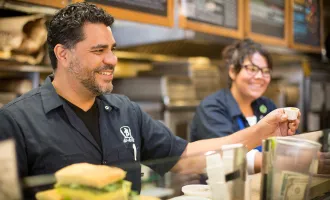The Art of the Accessible: Social Kitchen and Brewery’s Kim Sturdavant
It’s 5 o’clock on a Friday in the Inner Sunset, and Social Kitchen and Brewery has collected a sizable happy-hour crowd eager to blow off some steam. It’s an eclectic, chatty group of professionals, local residents, college grads and hipsters, and the bartender busily dispenses pints of beer to the thirsty masses.
Perched above the bustle, amidst the shiny set of tuns and fermenters where Social Kitchen’s beer is made, brewmaster Kim Sturdavant is finishing his workday as well.
Sturdavant is an easygoing, athletic-looking Oregon native who may not seem like a stereotypical brewer. He studied engineering and broadcasting in college. He’s just as much at home talking about jazz and cooking as he is discussing beer.
Engage him in a discussion about brewing, however, and you can tell instantly that he’s got a passion for it. Try a pint of his beer, and it's obvious he’s got the talent to back it up.
Sturdavant entered the beer world on the basis of a love of good food and a knack for home brewing, and in 2006, he began his career working under brew master Arne Johnson at the venerable Marin Brewing Company in Larkspur.
He started out humbly. “I was scrubbing floors, labeling bottles, cleaning kegs, filling kegs, offloading bottling machines, doing all the grunt labor that you do when you start out in a place like that,” he recalls.
Sturdavant embraced the physical labor, paid his dues and reaped the dividends. His formative years at Marin gave him a comprehensive lesson in all areas of brewcraft. In his spare time, he homebrewed in his backyard to experiment with ingredients and beer styles.
Then in 2010, he took a trip to England and had the opportunity to meet and make beer with craft brewers in London. While many American craft beer styles have English roots and even share the same ingredients, Kim discovered that how those ingredients are used yields strikingly different results.
“What they were doing there opened my eyes to what English beer really is,” he explains. “In general, their beers are a lot cleaner, there's a lot more finesse. English ingredients are very flavorful, so they’re almost trying to tone down their beers to make them cleaner. In a way, they’re trying to make clean American craft beer to let the hops shine through, and here we’re trying to use the same ingredients to try to make the beer bigger.”
The lessons from England were not lost on Sturdavant. In 2012, he left Marin to take over as brew master at Social Kitchen, where he has quickly come into his own. His brewing style is focused primarily on sessionable, easy-drinking beers that showcase their ingredients.
“My whole approach to beer is that it should be very accessible, and everybody should be able to drink it.” But, he adds, “Just because it's accessible doesn’t mean it's boring.”
The Skimmer’s ESB and SF Session Ale are good examples of this aesthetic. The low 4.5-5 percent alcohol content and careful balance in ingredients and flavor results in a rewarding pour both for the beer geek and the more casual drinker. These beers, while English in style, are not copycats, and fit nicely somewhere between traditional English and West Coast American sensibilities.
Sturdavant has also added his own touch to Social Kitchen’s signature Rapscallion Belgian ale, and the rotating lineup also regularly includes lighter styles, such as the SKB Pilsner and stronger stuff, including new brews for Strong Beer Month (i.e. February) and an immaculate Baltic Stout made in collaboration with Firehouse’s Steve Donohue.
For Sturdavant, there is no distinction between brewing a crowd-pleaser and a beer he feels personally and creatively gratified by.
“You can make an accessible, really delicious and interesting beer all at the same time,” he points out. “That’s the ultimate expression of the brewing art form, something for the community to drink and enjoy.”
Kim Sturdavant joins a growing wave in the craft beer industry that, amidst the success of the strong beer revolution, has decided to focus its creative energy on subtlety and finesse. From his brew lab above the crowds at Social Kitchen, he sees that things are looking up.
“I think in general beer is just going to get better and better,” he predicts. “We’re less paranoid now, which will allow us to push boundaries more, and focus on the right things. We’re getting better at knowing what to worry about and what not to worry about, and through that, we’ll make better beer.”


